Generic Medicines
Taj Pharma is the largest generic pharmaceutical company in India. We hold top positions in different established markets worldwide generics markets..
With its ancient culture and the Himalayas as a backdrop landlocked Nepal has a romantic image.
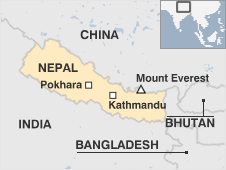 |
It is nonetheless one of the world's poorest countries and is struggling to overcome the legacy of 10-year Maoist insurrection.
Until Nepal became a republic in May 2008 it had been ruled by monarchs or a ruling family for most of its modern history in relative isolation.
AT-A-GLANCE
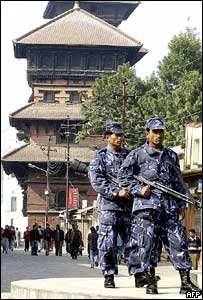 Politics: Historic elections in April 2008 led to abolition of centuries-old monarchy
Economy: Civil strife wrecked the economy and Nepal is dependent on aid; tourism is a key foreign exchange earner
|
A brief experiment with multi-party politics in 1959 ended with King Mahendra suspending parliament and taking sole charge in 1962.
Democratic politics was introduced in 1991 after popular protests but was marked by frequent changes of government. The last king of Nepal Gyanendra twice assumed executive powers - in 2002 and 2005.
Maoist rebels waged a decade-long campaign against the monarchy leaving more than 12 000 people dead and 100 000 people displaced according to UN figures.
When King Gyanendra's direct rule ended under public pressure in April 2006 the rebels entered talks with the parliamentary government on how to end the civil war.
A peace deal was agreed in November although the Maoists continued to press for abolition of the monarchy.
Parliament agreed to the condition in December 2007 and the Maoists emerged as the largest parliamentary party after elections in April 2008.
The monarchy was abolished a month later and a Maoist-dominated government took office in August.
Nepal has been at odds with neighbouring Bhutan over the repatriation of thousands of Bhutanese refugees of Nepalese descent who fled violence in Bhutan in the early 1990s.
Nepal has the flourishing tourism industry but faces problems of deforestation and encroachment on animal habitats.
Most of the population depend on agriculture and the UN estimates that about 40% of Nepalis live in poverty.
Foreign aid is vital to the economy and Nepal is also heavily dependent on trade with neighbouring India.
President: Ram Baran Yadav
Mr Yadav became the first president of republican Nepal in July 2008 nearly two months after the country's new constituent assembly had voted to abolish the 239-year-old monarchy.
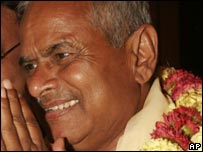
Mr Yadav's appointment came after weeks of political deadlock
|
He is an ethnic Madheshi from Nepal's southern lowlands and was backed by the centrist Nepali Congress - the second largest party in parliament - as well as two smaller parties.
Mr Yadav is a trained medical doctor and has twice served as health minister. He has also held senior positions in the Nepali Congress.
The presidency is a largely ceremonial position.
Prime Minister: Madhav Kumar Nepal
Nepal's parliament elected veteran communist leader Madhav Kumar Nepal as the country's new prime minister on 23 May 2009.
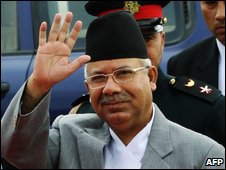
Prime Minister Madhav Kumar Nepal
|
Mr Nepal aged 56 was elected unopposed by MPs ending a deadlock caused when his predecessor as premier Maoist leader Prachanda stepped down after only eight months in the post.
Prachanda who led the Maoist rebels in a decade-long civil war until 2006 came to power in elections in 2008 but quit after his bid to fire the army chief failed.
Mr Nepal considered a moderate leftist won the backing of an alliance of 22 parties that holds 350 seats in the 601-member constituent assembly.
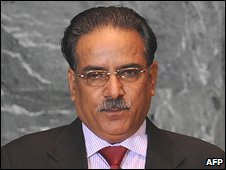
Maoist leader Prachanda
|
The Maoists said they would boycott the new parliament and vowed to keep up street protests against President Yadav who intervened to reinstate army chief General Rookmangud Katawal. Prachanda had accused General Katawal of undermining the civilian government.
The political crisis has raised fears about the 2006 agreement that ended the civil war and the new prime minister immediately stressed that the peace deal was his priority.
Mr Nepal has promised to try to bring the Maoists back into the government. Drafting a new Nepalese constitution by a May 2019 deadline will be another big challenge facing him as premier.
Nepal's long-running civil conflict and the efforts to suppress it had a profound impact on the media.
Rights groups say attacks on media workers were perpetrated by both sides during the 10-year Maoist rebellion.
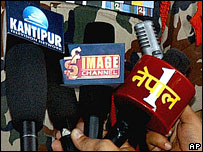
Private TV stations operate alongside state-run networks
|
More recently media freedom body Reporters Without Borders has raised concerns about communal violence in the south which it says has forced some reporters to flee. Under the 2006 peace deal journalists "regained their freedom but not their safety" it says.
Private TV and radio stations have flourished. The government operates radio and TV services and publishes a Nepali-language daily and an English-language newspaper.
There is a small film industry nicknamed "Kollywood". But Indian films are staple fare in cinemas.
BBC World Service broadcasts on FM in Kathmandu.
The Press
Television
Radio
News agency/internet
nepalnews.com - private online news
AFRICA | ASIA-PACIFIC | AMERICAS | EUROPE | MIDDLEEAST | SOUTHASIA
![]()
![]()
![]()
Mauritania Mauritius Morocco Mozambique Namibia Niger Nigeria Republic-of-congo Rwanda Sao-tome-and-principe Senegal Seychelles Sierra-leone Somalia South-africa Sudan Swaziland Tanzania The-gambia Togo Tunisia Uganda Australia Brunei Burma Cambodia China East-timor Fiji Indonesia Japan Kazakhstan Kiribati Kyrgyzstan Laos Malaysia Marshall-islands Micronesia Mongolia Nauru New-zealand North-korea Palau Papua-new-guinea Samoa Singapore Solomon-islands South-korea Taiwan Tajikistan Thailand The-philippines Tonga Turkmenistan Tuvalu Uzbekistan Vanuatu Vietnam Antigua-and-barbuda Belize Bolivia Brazil Canada Chile Colombia Costa-rica Cuba Dominica Dominican-republic Ecuador El-salvador Grenada Guatemala Guyana Haiti Honduras Jamaica Mexico Nicaragua St-kitts-and-nevis St-lucia Suriname Trinidad-and-tobago Uruguay Venezuela Albania Andorra Armenia Austria Azerbaijan Belarus Belgium Bosnia-hercegovina Bulgaria Croatia Cyprus Czech-republic Denmark Estonia Finland France Georgia Germany Greece Hungary Iceland Ireland Italy Latvia Liechtenstein Lithuania Luxembourg Macedonia Malta Moldova Monaco Montenegro Norway Poland Portugal Russia San-marino Serbia Slovakia Slovenia Spain Sweden Algeria Egypt Iran Iraq Israel-and-palestinian-territories Jordan Kuwait Lebanon Libya Mauritania Oman Saudi-arabia Sudan Syria Tunisia United-arab-emirates Yemen Afghanistan Bangladesh Bhutan India Nepal Pakistan Sri-Lanka The-Maldive